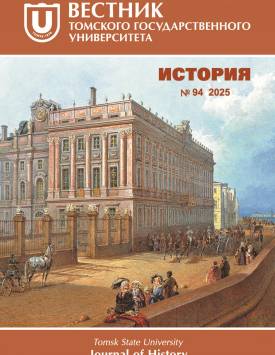The role of border commissioners in the context of diplomatic interaction between Russia and China in the middle of the 19th and early 20th centuries
The article considers the institution of border commissioners as a mechanism for cross-border cooperation between Russia and China in the middle of the 19th and early 20th centuries. It is noted that the growing interest of the United Kingdom, the United States, France, and Germany in the Asian region has stimulated Russian government action in the east. A series of treaties delimiting the border territories of Russia and China laid the groundwork for the establishment of mechanisms for diplomatic cooperation between the two powers. The institution of border commissioners is a key mechanism. The historiography of the question is presented by several publications, highlighting selected parts of the organization and activities of border commissions. The purpose of the study is to carry out a comprehensive analysis of the organization and activities of the border commissions in Siberia and the Far East in the 19th and early 20th centuries on the basis of synthesis of available information and documents from the Foreign Policy Archive of the Russian Empire for the first time in scientific circulation. The methodological basis of the study is the concept of the frontier applied to Siberia and the Far East. The author notes that the Border Commissioner position emerged in the administrative system of the suburbs at the time of its incorporation into the general imperial space under the influence of foreign policy factors. The first references to border commissioners are to be found in the Kyacht Tractate, concluded in 1727 by S.L. Wladyslaw-Raguzynski. The treaty terms considered in addition to territorial delimitation, the establishment of a number of posts to carry out demarcation work, organize border security and interact with Chinese authorities. On the basis of analysis of sources, the author suggests that the post of Border Commissioner, established in the mid-19th century, is based on the authority of A. Tretyakov, the border captain F. Knyaginkin, the interpreter. The article chronologically presents information on the establishment of Border Commissioners' position in Kyacht, South Ussuri Territory, Amur Region, and Uryankhay Territory. The author draws attention to the duties, staffing, content, and specific activities of the border commissioners. It is noted that, in view of the foreign policy situation on the eastern part of the Russian-Chinese border, the border commissioners were carrying out special tasks aimed not only at maintaining good-neighborly relations with the Asian Powers, but also to ensure and defend national interests in the Far East. The author notes that the Border Commissioners acted as a foreign policy mediator between the central and regional authorities. Their activities served as a prerequisite for maintaining mutual relations between Russian and Chinese citizens, between the indigenous and Russian populations, and were likely to ensure social stability. The authors declare no conflicts of interests.
Keywords
Far East, China, state border, border territory, cooperation, border commissioners, national interestsAuthors
| Name | Organization | |
| Mamkina Inna N. | Zabaikalsky State University; Transbaikal Scientific Center Institute of History, Archaeology and Ethnology, the Far Eastern Branch of Russian Academy of Sciences | inna-mamkina@yandex.ru |
References

The role of border commissioners in the context of diplomatic interaction between Russia and China in the middle of the 19th and early 20th centuries | Tomsk State University Journal of History. 2025. № 94. DOI: 10.17223/19988613/94/8
